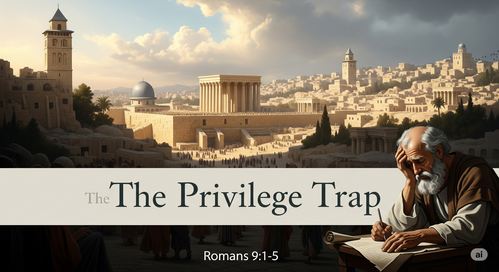June 25th, 2025
by Mitch Davis
by Mitch Davis

Paul's anguish in Romans 9:1-5 reveals a startling truth that should shake every believer to their core: privilege doesn't guarantee faith.
Israel had it all. They were God's adopted children, witnessed His glory, received His covenants, were given His law, practiced His prescribed worship, held His promises, descended from the patriarchs, and—most incredibly—the Messiah himself came from their lineage. No nation in history had such spiritual advantages.
Yet they missed Him. They rejected the very One their entire history pointed toward.
This isn't just ancient history—it's a mirror for the modern church.
How many of us have grown up in church, memorized verses, attended Bible studies, and sung worship songs, yet somehow missed the heart of the gospel? How many have mistaken familiarity with God for intimacy with God?
The most spiritually privileged can become the most spiritually blind. Church attendance becomes routine. Prayer becomes ritual. Scripture becomes academic. We know about Jesus without truly knowing Jesus.
Israel's tragedy warns us: proximity to truth doesn't equal possession of truth. You can sit in the front row of every service, volunteer for every ministry, and even preach sermons, while your heart remains untouched by grace.
The remedy isn't less privilege—it's humility in the face of privilege. Every spiritual advantage we've received is an undeserved gift, not a badge of superiority. Every moment of worship, every sermon heard, every prayer answered should drive us to our knees in gratitude, not puff us up with pride.
Paul's broken heart over Israel reveals what our hearts should feel for those around us who have heard the gospel repeatedly but remain unmoved. That longtime church member who seems spiritually dry. That preacher’s kid who's walked away. That friend who grew up Christian but now claims to be "spiritual but not religious."
The question isn't whether we have spiritual privileges—it's what we're doing with them. Are they softening our hearts or hardening them? Are they increasing our dependence on God or our confidence in ourselves?
Don't let familiarity breed contempt. Don't let advantages become assumptions. Every day, ask God to give you fresh eyes to see Him, fresh ears to hear Him, and a fresh heart to love Him.
Because privilege without humility is the most dangerous position of all.
Israel had it all. They were God's adopted children, witnessed His glory, received His covenants, were given His law, practiced His prescribed worship, held His promises, descended from the patriarchs, and—most incredibly—the Messiah himself came from their lineage. No nation in history had such spiritual advantages.
Yet they missed Him. They rejected the very One their entire history pointed toward.
This isn't just ancient history—it's a mirror for the modern church.
How many of us have grown up in church, memorized verses, attended Bible studies, and sung worship songs, yet somehow missed the heart of the gospel? How many have mistaken familiarity with God for intimacy with God?
The most spiritually privileged can become the most spiritually blind. Church attendance becomes routine. Prayer becomes ritual. Scripture becomes academic. We know about Jesus without truly knowing Jesus.
Israel's tragedy warns us: proximity to truth doesn't equal possession of truth. You can sit in the front row of every service, volunteer for every ministry, and even preach sermons, while your heart remains untouched by grace.
The remedy isn't less privilege—it's humility in the face of privilege. Every spiritual advantage we've received is an undeserved gift, not a badge of superiority. Every moment of worship, every sermon heard, every prayer answered should drive us to our knees in gratitude, not puff us up with pride.
Paul's broken heart over Israel reveals what our hearts should feel for those around us who have heard the gospel repeatedly but remain unmoved. That longtime church member who seems spiritually dry. That preacher’s kid who's walked away. That friend who grew up Christian but now claims to be "spiritual but not religious."
The question isn't whether we have spiritual privileges—it's what we're doing with them. Are they softening our hearts or hardening them? Are they increasing our dependence on God or our confidence in ourselves?
Don't let familiarity breed contempt. Don't let advantages become assumptions. Every day, ask God to give you fresh eyes to see Him, fresh ears to hear Him, and a fresh heart to love Him.
Because privilege without humility is the most dangerous position of all.
Mitch Davis
Recent
Archive
2026
2025
July
August
September
October
November
Categories
Tags
2 Timothy 1:7
Action
Authoroties
Battle
Bible
Birth
Christ
Creeds
Death
Delivery
Deuteronomy
Discipleship
Division
Doctrine
Elijah
Elvis
Evangelism
Faithful Few
Faith
Fasting
Fausto Leon
God's 7000
God's Grace
God's Remnant
God\'s 7000
God\'s Grace
God\'s Remnant
Gospel
Government
Healing
Hope
Humility
Irenaeus
Israel
Jesus
Jordan Kinard
King
Law
Letter
Life
Lima
Living Sacrifices
Logic
Luis Canales
Maturity
Mercy
Mitch Davis
Mitch
Opinion
Paul
Peru
Prayer
Privilege
Repentance
Report
Resolution
Righteousness
Romans 12
Romans 13
Romans 14
Romans 9:1-5
Romans
Rule of Faith
Science
Spain
Submission
Talents
Tennessee
Trip
Truth
Unity
Warfare
War
Wisdom
fear
fourth of July
freedom
love
power
sound mind

No Comments